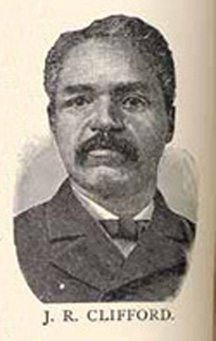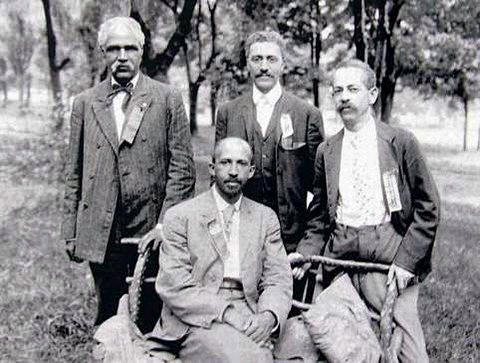John R. Clifford, the son of Isaac and Satilpa Clifford, was born at Williamsport, Grant County, West Virginia, on September 13, 1849.
During the Civil war, he was a Union soldier in Company F, 13th United States Heavy Artillery, attaining the rank of Corporal. Volunteering at Chicago and serving for three years, John R. Clifford saw service in Kentucky, Tennessee, and Eastern Virginia under General Grant. His brother, the Rev. Theodore K. Clifford, was also in the Union service. Evan Kent, grandfather of John R. Clifford, belonged to the “Mingo Tribe,” which inhabited Hardy County in 1776. His father’s grandfather, Jacob Clifford, was of Irish descent and contributed to the settlement of Hardy County, West Virginia. A valley in that county is called “Clifford’s Hollow,” in Jacob’s honor.
J.R. Clifford was the first African-American lawyer admitted to the bar in West Virginia. He was educated at Chicago High School, graduated at Storer College, 1875, received a diploma, degree of A.M. Shaw University, Raleigh, North Carolina. He taught at Keyser and Williamsport, West Virginia, Grant County, and Moorfield, Hardy County, West Virginia. He founded and published the “Pioneer Press” at Martinsburg for 16 years — it was the first African-American newspaper in West Virginia, and the oldest in the country at the time of its discontinuance. It was devoted to “the uplift of that race.”
On December 28, 1876, at Harpers Ferry, Jefferson County, West Virginia, John R. Clifford and Mary Franklin were married. She was born in Lexington, Rockbridge County, Virginia, on March 29, 1859, and was a daughter of Albert and Mary E. Franklin. Her mother continued to live in Jefferson County; her father was deceased by 1884. John R. and Mary Clifford had the following children: Albert F. Clifford, October 28, 1877-?; Maud K. Clifford, August 19, 1879-?; and Paul P. Clifford, July 1, 1882-?.
John R. Clifford was a 32nd Degree Mason; lecturer for the State of West Virginia; Past Grand Master of West Virginia; First Vice President of the American Negro Academy; a member of a Committee on the “Wise Men,” an organization that met in Atlanta, Georgia, in 1881
John R. Clifford was principal of the colored city school of Martinsburg, Berkeley County, West Virginia.
West Virginia Civil Rights Pioneer John Robert “J. R.” Clifford was born in 1848 on a farm near Moorefield, West Virginia, to free black parents. At age 15, Clifford joined the Union Army and fought in the Civil War. After the war, Clifford attended Storer College in Harpers Ferry, and became a school principal in Martinsburg. In 1882, Clifford founded the national African American newspaper, the Pioneer Press, and became active in state and national African American politics. Clifford “read law” in a local attorney’s office and in 1887 he was admitted to practice before the West Virginia Supreme Court of Appeals, becoming West Virginia’s first African American lawyer.
1906: Storer College, Harper’s Ferry, WV: Niagara Movement Leaders (l-r)
John Robert (J.R.) Clifford, Wm. E.B. DuBois, L.M. Hershaw, F.H.M. Murray
“I attended a Teacher’s Institute . . . held at Harper’s Ferry, in 1877. There I first saw a gathering of young teachers, vigorous and alert, none more chivalric in bearing than the central figure in the person of John R. Clifford, at that time Principal of the Grammar School at Martinsburg. . . . he helped to shoot off the shackles from four million slaves and cement this Union on the bloody battle fields during the war of the sixties and holds an honorable discharge in proof of it.” John W. Cromwell, Journal of Negro History, Vol. 8, No. 3, July, 1923.
In 1892, Clifford became the attorney for Mrs. Carrie Williams, a Tucker County African American schoolteacher. Clifford represented Mrs. Williams in a landmark West Virginia civil rights case from the Blackwater Canyon region of Tucker County, Williams v. Board of Education (W. Va. 1898). The Williams case established the right of the children of African American workers in Henry Gassaway Davis’ West Virginia Tucker County coal mines and coke ovens (and all African American schoolchildren in West Virginia) to school terms of equal length as those enjoyed by white children. The Williams case also established the right of African American schoolteachers in West Virginia to equal pay – a right that over decades led to a remarkable level of excellence in West Virginia’s public segregated colleges for African Americans prior to 1954.
The Williams case was a first in American jurisprudence, and played an important role in establishing West Virginia as a State where African Americans could exercise rights and opportunities (education, voting, jury service) that translated into political and economic power. The exercise of these rights and this kind of power by African Americans after the Civil War, in West Virginia and elsewhere, led to the emergence of a new level of African American educational, civic, religious, business, academic, and political leadership – people like J. R. Clifford, and Clifford’s younger friend and colleague, William E. B. DuBois.
This leadership became the crucible of the civil rights movement of the 20th century, which crystallized its vision at the 1906 Niagara Movement meeting at Harpers Ferry, West Virginia, in August of 1906. In August of 2006, Harpers Ferry National Historical Park will commemorate the 100th Anniversary of the gathering of the Niagara Movement, the first major civil rights organization of the 20th century.
John Robert Clifford was a leading organizer and participant in the 1906 Niagara meeting. Clifford’s daughter Mary delivered the opening Credo at the 1906 meeting, written by Dubois and recognized as one of the most important pieces of 20th Century African American writing — of a par with Dr. Martin Luther King, Jr.’s 1963 “I Have A Dream” speech. Clifford was an active leader in African American efforts for justice until his death in 1933.
The Niagara Movement was the forerunner to the National Association for the Advancement of Colored People (NAACP). Determined to take their rightful place in society, Niagara members demanded equal enforcement of the law for all races and active political involvement at all levels of society. The group’s 1906 meeting was later described by Wm. E. B. DuBois as “one of the greatest meetings that American Negroes ever held.”
J. R. Clifford
- 1848—Clifford was born September 13, 1848 to Isaac and Mary Kent Clifford of Hardy (now Grant) County, Virginia. Free blacks. Isaac was a laborer/farmer.
- 1858—Sent to Chicago to school.
- 1864—Enters into the 13th Regiment U.S. Heavy Artillery, Company F, organized at Camp Nelson, Kentucky organized June 23, 1864. 13th was attached to the Military Department of Kentucky and mustered out in November of 1865. On African American War Memorial, Plague B-28. Honorably discharged.
- 1873—Enters Storer College, Harpers Ferry, West Virginia.
- 1875—Graduates from Storer Normal College.
- 1875-1885—Teacher/Principal at Sumner School in Martinsburg, West Virginia
- 1882—Attends Knights of the Wise Men Convention in Atlanta, Georgia. Gives address.
- 1882—Starts the Pioneer Press in Martinsburg, West Virginia
- 1887—Becomes the first African American in West Virginia to pass the bar exam after studying with J. Nelson Wisner. Practices for 46 years.
- 1896—State Supreme Court of Appeals–Martin vs. Board of Education, Morgan County.
- 1897—Charter member of the American Negro Academy.
- 1898—State Supreme Court of Appeals–Williams vs. Board of Education, Tucker County.
- 1906—Organizer for the 2nd Annual Meeting of the Niagara Movement, organized by W.E.B. DuBois, held at Harper’s Ferry, West Virginia.
- 1911-1913—President of the National Independent Political League organized by William Monroe Trotter.
- 1917—Pioneer Press closes.
- 1933—Clifford dies on October 6, 1933 at the age of 85. Buried in Mt. Hope Cemetery, Martinsburg, West Virginia.
- 1954—Reburied at Arlington National Cemetery.
- CLIFFORD, JOHN
- CPL CO F 13 REGT US COL HV ARTY USA
- DATE OF BIRTH: 09/15/1848
- DATE OF DEATH: 10/06/1933
- BURIED AT: SECTION 33 SITE 6937
ARLINGTON NATIONAL CEMETERY
- CLIFFORD, MARY FRANKLIN WID OF CLIFFORD, JOHN
- DATE OF BIRTH: 03/29/1859
- DATE OF DEATH: 04/01/1940
- BURIED AT: SECTION 33 SITE 6938
- ARLINGTON NATIONAL CEMETERY
WIFE OF JR CLIFFORD, CPL CO F 13 REGT US COL HV ARTY USA
Michael Robert Patterson was born in Arlington and is the son of a former officer of the US Army. So it was no wonder that sooner or later his interests drew him to American history and especially to American military history. Many of his articles can be found on renowned portals like the New York Times, Washingtonpost or Wikipedia.
Reviewed by: Michael Howard


